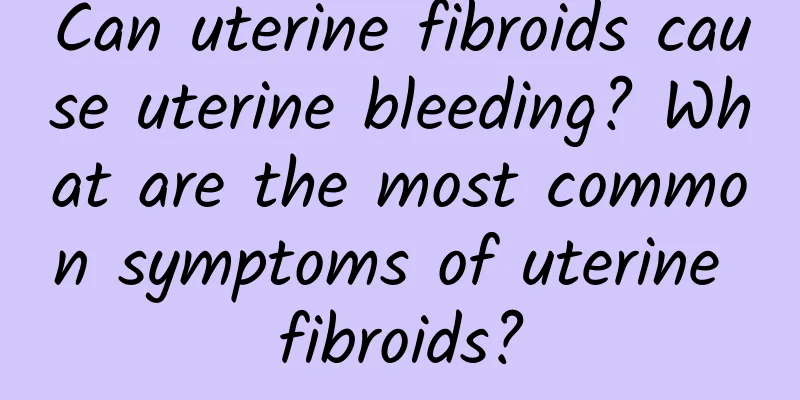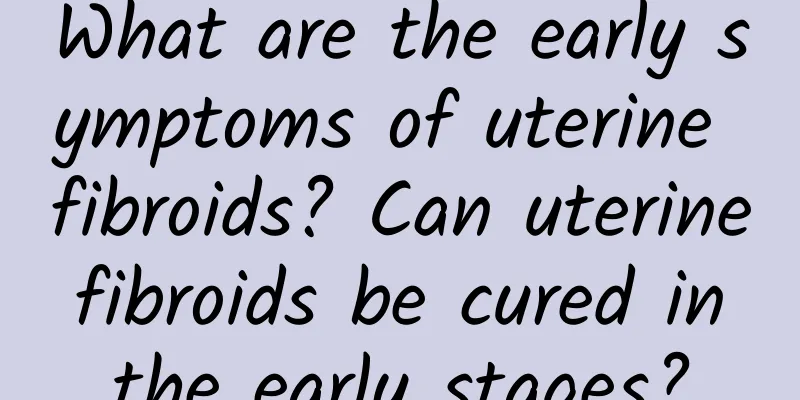What are the symptoms of uterine fibroids? How to identify uterine fibroids

|
The symptoms of uterine fibroids are not obvious in the early stage. Only when the uterine fibroids are large in size or grow in a special location will obvious symptoms appear, mainly including the following aspects: Pain: Generally there is no pain. However, when the fibroids undergo red degeneration or the pedunculated fibroids are twisted or the submucosal fibroids stimulate the uterus to have spasmodic contractions, it can cause acute abdominal pain. Uterine fibroids can affect women's menstruation, leading to abnormal menstruation and increased bleeding. For example, long-term heavy menstruation caused by uterine fibroids can lead to secondary anemia. In severe cases, it manifests as general fatigue, pale face, shortness of breath and palpitations. Menstrual changes: Menstrual changes are the most common symptoms of uterine fibroids, which are manifested as increased menstrual volume, shortened cycle or prolonged menstrual period, and irregular bleeding. Submucosal fibroids can cause bleeding due to increased mucosal area and necrosis and infection on the surface. When intramural fibroids are larger, the uterine cavity becomes larger, the endometrial area increases, the uterus contracts poorly, or when combined with excessive endometrial hyperplasia, it manifests as shortened menstrual cycle, increased menstrual volume, prolonged menstrual period, etc. Increased vaginal discharge is common in larger intramural fibroids. Due to the enlargement of the uterine cavity, the glandular secretion increases, resulting in increased leucorrhea. When submucosal fibroids are accompanied by infection, the amount of leucorrhea is also large, and sometimes it may be bloody. Compression symptoms: The enlargement of fibroids can compress nearby organs and produce various symptoms. For example, uterine wall fibroids or cervical fibroids can compress the bladder, causing frequent urination, urination disorders, and urine retention. Compression of the ureter can cause hydronephrosis. Myomas on the posterior wall of the uterus can squeeze the rectum and cause difficulty in defecation. Infertility: 25-35% of patients with uterine fibroids may suffer from infertility because the fibroids hinder the implantation of the fertilized egg or the fibroids prevent the sperm from entering the fallopian tube. |
<<: What should I do if I suffer from uterine fibroids? What are the symptoms of uterine fibroids?
>>: Symptoms of uterine fibroids Can uterine fibroids cause uterine bleeding
Recommend
What causes white lesions on the vulva?
What are the causes of white lesions on the vulva...
Experts explain sports therapy for treating dysmenorrhea
Physical therapy is a common method for treating ...
Experts give advice on how to prevent cervicitis
Cervicitis is usually caused by exogenous infecti...
Get rid of the pear-shaped thigh fat. Japanese experts suggest 2 steps to take care of both the inside and outside.
The weather is getting hotter and hotter, and I c...
What is the difference between abortion and curettage?
What is the difference between abortion and curet...
Several common symptoms of dysmenorrhea in women
Many female friends do not understand the symptom...
Why does Bartholinitis keep recurring?
Gynecologists point out that the Bartholin's ...
How long does it take to get pregnant again after curettage?
It is recommended to wait at least 6 months to 1 ...
What is the best way to treat uterine fibroids?
The best method for treating uterine fibroids nee...
Is Bartholinitis contagious during the incubation period?
Bartholinitis is a gynecological disease caused b...
Will eating rapeseed in early pregnancy cause miscarriage? High nutritional value
Rapeseed is a food that we often eat. In fact, it...
What should I pay attention to if I have uterine fluid accumulation?
One of the most feared diseases for women is gyne...
Can I eat Lanbuzheng if I have uterine cold and dysmenorrhea?
For uterine cold and dysmenorrhea, you can eat La...
What are the symptoms of menopause?
Menopause is a disease that some women will exper...
Let’s learn about the symptoms of chronic adnexitis
What are the symptoms of chronic adnexitis? The s...









